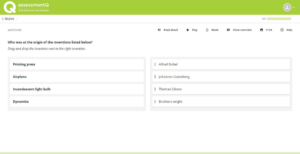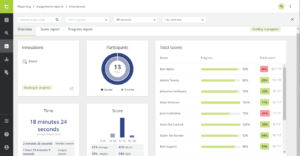
What are the main advantages of e-assessment?
An increasing number of organisations move to digital or e-assessment. And the corona pandemic has only increased the adoption of e-assessment all over the world, in a multitude of sectors and for a wide range of use cases. But what is e-assessment exactly, and how could your organization benefit from it? Let’s have a closer look.
What is E-assessment?
E-assessment is also known as electronic assessment, digital assessment, online assessment, on screen assessment or computer-based assessment. It refers to the use of information technology to assess knowledge, skills and progress. E-assessment is often presented as a way to overcome the shortcomings of traditional pen and paper assessments.
E-assessment uses various question types to measure knowledge and skills. When selecting an e-assessment platform, make sure it offers a wide range of question types so you can measure different kinds of knowledge and skills effectively.
Types of e-assessment
There are several types of e-assessment. The two most common types are:
- Formative assessment: a formative assessment is basically an exercise or a practice test. It allows the candidate to check to which extent he or she masters a certain topic. Giving feedback is crucial in formative assessments, so the candidate knows where to work upon and can learn from his mistakes.
- Summative assessment: a summative assessment is basically an exam. It contributes to a student’s final score, or defines if someone gets certified, accredited, or is accepted to start a study or job. It is crucial for summative assessments to be valid, reliable and delivered securely. Fortunately, it is much easier to secure and analyse online exams than that is the case for its pen and paper counterpart.
So, what are the five main advantages of e-assessment?
E-assessment has many advantages when compared to traditional paper-based assessments, both for your organization and for your users. Here are some of the main ones.
1. Centralised knowledge
 What happens when your Subject Matter Expert leaves? Do you have to dig into his papers, documents, spreadsheets and e-mails to properly transfer his knowledge to someone else? Or think about the amount of knowledge that gets lost when a teacher retires…
What happens when your Subject Matter Expert leaves? Do you have to dig into his papers, documents, spreadsheets and e-mails to properly transfer his knowledge to someone else? Or think about the amount of knowledge that gets lost when a teacher retires…
In an e-assessment platform like assessmentQ, all SME knowledge is available in a common format, i.e. as questions that anyone can reuse. You can control who has access, and find back everything you need thanks to the full-text search capabilities and metadata. Your organization builds a centralized and reusable knowledge repository that way, from which users will only benefit.
2. Authentic experience for your users
You undoubtedly work in a digital environment. Products, orders, proposals, meetings, etc are managed digitally. Many employees work on their laptop day in, day out. How authentic is a paper exam then? How does it relate to their everyday work experience?
Or what about students who take notes on their laptop, practice using digital tools, write on their device with a stylus, and then have to go back to the old-fashioned pen and paper for their exam?
There is no doubt that digital practice and examination is becoming rapidly more authentic than pen and paper.
3. Speed to results
 How long do you have to wait for results after a paper-based exam? Have you ever seen the stress a teacher faces in the exam period, when tens or hundreds of exam copies are waiting for his fair and objective judgement?
How long do you have to wait for results after a paper-based exam? Have you ever seen the stress a teacher faces in the exam period, when tens or hundreds of exam copies are waiting for his fair and objective judgement?
In e-assessment, many question types are scored automatically, saving SMEs or teacher a lot of correction time. And when you opt for essay questions instead or on top of the closed questions, platforms like assessmentQ can help you with a semi-automatic correction already, while still giving you the final word on the actual result. Further, you can distribute the results with one click of a button to hundreds of participants.
This is a true win-win: participants get their results faster, and you save a lot of time in the correction process.
4. Flexibility
Do you need to fix a typo in your exam last-minute? That is hard when all copies have just been printed, right? Or what happens when you discover that a question is utterly wrong and should be removed from the exam? More stress?
Not in an e-assessment platform: you can do last-minute changes before the exam starts, or exclude questions from an exam afterward. Everyone’s score will be adjusted automatically, and you can rest assured that your exam will stand every validity test.
5. Personalisation
The challenge in traditional exercises in exams is that there is no one-size fits all: your students or employees all have different knowledge levels, motivation and definitions of “good” exercises or exams.
There is no proper solution for this problem when you work with pen and paper. In e-assessment platforms however, you can use adaptive paths so every participants can practice or take an exam at his own level. Using metadata, you can easily link difficulty levels to questions, and let your users work with for example increasingly more difficult questions. This is not only useful for pre-tests, but also for high-stakes exams, or in a practice context, where the users is challenged at the right level.
And also: peace of mind
One final advantage that digital assessments offer over traditional pen and paper exams is the assurance that they cannot get lost or stolen. We all know news stories about universities or other organisations needing to face the embarrassing reality of lost paper exams, causing immense stress and rework, both for examiners and students.
With digital assessments, however, exam copies are securely stored and backed up in the cloud, which eliminates the risk of misplacement, theft or loss.
Do you want to know more about e-assessment for your specific context? Get in touch and we’ll be happy to help!

Let’s talk
Schedule a 15-minute call, and discuss your challenges with our experts.

Filip Vanlerberghe
Filip is passionate about web-based software. As a Product Manager at Televic Education, he applies about 20 years of experience in software, usability, e-learning, marketing and strategy. Previously, he was Director of Corporate Product Development in an international company. As an entrepreneur, he also owns and participates in several smaller businesses.

